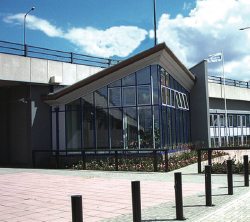Oventrop valves help provide local control of business-unit heating

Heating for 88 business units in this new development in east London is provided by seven small plant rooms with local control based on Oventrop valves.
As part of individually controlled heating systems served by seven centralised plant rooms, Oventrop valves have been used for isolation, regulation and commissioning. The 4300 m2 Waterfront Studio is on vacant land beneath the Silvertown Way flyover in east London. A business centre of 88 units provides a range of rooms and suites from 30 to 200 m2 at economic rents, with all services provided. There are also some commercial and storage units. Heating is based on seven locally zoned heating systems in self-contained plant rooms, each with its own condensing boiler, circulation pump and pressurisation units. Each business unit has its own radiator heating, with individual time and temperature control. An advantage of having seven ‘district-heating’ schemes is that they can be maintained by any qualified heating engineer, rather than one with industrial qualifications, which would be more expensive. Oventrop wheel and lockshield radiator valves are fitted to all 195 radiators. From a specification developed by consulting engineers Jacobs Babtie, Capri Mechanical Services developed the heating system as a design-and-build contract using Oventrop isolating valves, strainers, commissioning sets and radiator valves. The control element relies on the Oventrop valves, dispensing with the need for a building-management system.
Related links:


